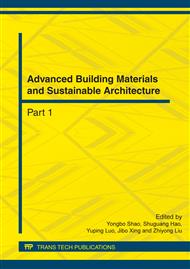p.2520
p.2524
p.2529
p.2533
p.2541
p.2545
p.2549
p.2554
p.2558
From Pattern to Significance — On the Conversion of Experience Modes of Contemporary Western Landscape
Abstract:
As an important carrier of culture, landscape has been given a more profound meaning. People are no longer satisfied by the direct visual experience of landscapes, but pay more attention to the observation and care of its inner world. This kind of conversion lends to the change of aesthetic experience of people directly. This paper re-examines the development of landscape theory from the view of aesthetic “experience” according to the historic study of the development of contemporary Western landscape, and providing the useful suggestions for the modern cities’ landscapes design of China.
Info:
Periodical:
Pages:
2541-2544
Citation:
Online since:
May 2012
Authors:
Keywords:
Price:
Сopyright:
© 2012 Trans Tech Publications Ltd. All Rights Reserved
Share:
Citation:


